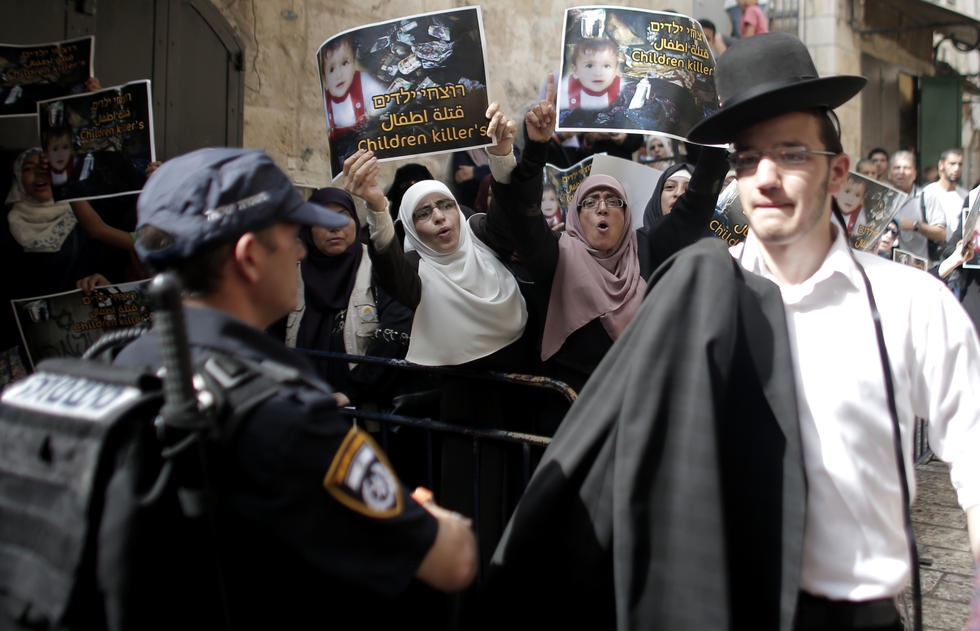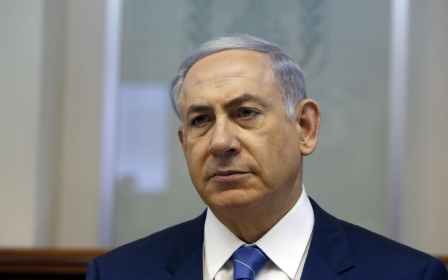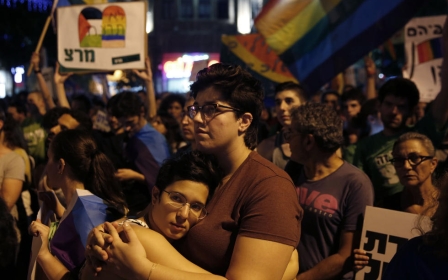Backlash against Israeli officials who denounced hate crimes

Israeli officials who have spoken out against the recent violent attacks that took place in Jerusalem and the West Bank village of Douma have faced abuse and assaults on their assets from other Israelis.
On Thursday, an ultra-orthodox Jewish man stabbed six people at the annual Jerusalem gay pride festival, resulting in the death of one teenager. The man, identified as Yishai Shlissel, was released from prison three weeks earlier after serving ten years for a similar attack at the 2005 parade. Denunciations were issued immediately, decrying the attack as a vile hate crime.
The following day, Israeli settlers, believed to be from the Maaleh Ephraim settlement, set fire to the Palestinian Dawabshe family home in their village, resulting in the death of 18-month-old baby Ali who was burned alive. His parents and four-year-old brother remain in the Israeli Saroka hospital in critical condition, suffering from third degree burns over most of their bodies.
The attack led to an outburst of protests in the West Bank, with Palestinian and Israeli officials condemning the attack as “terrorism". Israeli Prime Minister Benjamin Netanyahu, who fronts Israel’s right-wing government, tweeted that he was “shocked” by the murder of baby Ali.
“This is a reprehensible and horrific act of terrorism in every respect,” he wrote.
His Palestinian Authority counterpart, Rami Hamdallah, visited the family's village and told local reporters that the PA “does not accept Netanyahu’s condemnation".
“The responsibility lies with his government and the settlers that sit in it and incite to kill Palestinians," he said.
Thousands of Israelis protested in Jerusalem and Tel Aviv against both attacks, with some blaming the government for failing to rein in the violent settlers in Israeli society, going so far as to accuse the government of encouraging and incentivising their behaviour.
In Jerusalem’s Zion Square, Israeli President Reuven Rivlin acknowledged that more condemnations were not enough to ensure that similar future attacks would not occur.
“We cannot continue treating these as tragic coincidences,” he said. “We cannot put out of the fire with weak condemnations. We need to ask what kind of public atmosphere exists that allows for these bad apples to grow and flourish here.”
Car torched, online threats
Rivlin was the subject of online abuse after he labelled the arson attack as “Jewish terrorism” on Facebook.
“More than shame, I feel pain,” he wrote in both Arabic and Hebrew. “The pain over the murder of a little baby. The pain over my people choosing the path of terrorism and losing their humanity.”
“Their path is not the path of the state of Israel and is not the path of the Jewish people. Unfortunately, it seems that so far we’ve dealt with the phenomenon of Jewish terrorism limply.”
The post elicited over 2,000 responses, many of them negative and accusing Rivlin of being a traitor.
“Dirty traitor,” said one comment as quoted by the Maariv newspaper. “Your end will be worse than [Ariel] Sharon’s,” referring to the late former Israeli premier who spent eight years in a coma.
These comments have prompted Israeli police to investigate and “examine offensive publications against the president on social media".
Israeli legal officials did not comment on whether incitement to violence was among the suspected crimes under investigation.
On Saturday, after the mayor of Kiryat Yam, an Israeli town north of Haifa, condemned the arson attack on Facebook, his car was torched.
The mayor, David Even Zur, had posted, “On Tu B’Av, the festival of love, when around us we are seeing more and more displays of hatred and violence that makes us all cringe, we must love and respect each other."
“This is the time to remember the most important commandment, ‘Love thy neighbour as thyself,’ which encapsulates the entire Torah," he wrote.
No one was hurt when Even Zur's car was set on fire, but after discovering a bomb planted under the car's front seat, police have advised the municipality to provide a bodyguard for him.
A municipal spokesman said there have been no previous threats against Even Zur, and therefore officials believe the bombing was a hate crime in response to his post.
Culture of impunity
Early on Sunday morning, 56-year-old Amad Abu Sharah, a Palestinian citizen of Israel, was brutally beaten by three Israeli suspects at the entrance of his home in the town of Lod. Abu Sharah filed a complaint at the police station, claiming that he was attacked for being Arab and that he is not involved in any conflicts with anyone. The attackers fled the scene.
These latest attacks and hate crimes have forced the Israeli public to question the “culture of impunity” as journalists Susan Abulhawa and Jonathan Freedland put it, that the Israeli authorities gift such perpetrators. According to Israeli human rights group Btselem, the attack on the Dawabshe family home was “only a matter of time” and the eighth time that settlers torched inhabited buildings since 2012.
“This [is] due to the authorities’ policy to avoid enforcing the law on Israelis who harm Palestinians and their property,” Btselem’s statement read. “This policy creates impunity for hate crimes, and encourages assailants to continue.”
As Abulhawa highlighted in her column for Middle East Eye, since 2000, Israeli soldier and settler violence have killed 1895 Palestinian children yet not one Israeli has been imprisoned for these murders.
There are over 200 Jewish-only settlements and outposts in the West Bank, all illegal under international law, that house over half a million settlers. According to a report last year from the United Nations Office for the Coordination of Humanitarian Affairs (OCHA), settler attacks in the West Bank occur on an average of once a day, with 399 assaults in 2014 alone.
Jewish group against the Israeli state
The Israeli internal intelligence agency, the Shin Bet, believe that an underground settler movement called Hamered, which is Hebrew for ‘revolt’, is behind the attack on the Dawabshe family.
The group is responsible for carrying out terror acts against Palestinians, their lands, residences and houses of worship-often under the eyes and protection of the Israeli army- as a means to derail the Israeli government. According to Haaretz, the group does not believe in the Israeli government or state system, and plans on establishing a ruling structure based on halakha, or Jewish law.
The group is comprised of tens of people who carry out acts centred in West Bank settlement outposts but wander all over the country, including within the Green Line.
The Shin Bet believe that Meir Ettinger, the grandson of the late right-wing extremist Rabbi Meir Kahane, is the leader of Hamered and was responsible for the June torching of the Church of the Multiplication of the Loaves and Fishes, northwest of the sea of Galilee.
Yet Ettinger, who has a restraining order that prevents him from being in Jerusalem and the West Bank, denied that he was involved in the group. In a blog post he wrote on Friday, he contended that “lies” made up by the Shin Bet.
“Whoever made up this lie knows better than anyone else that his remarks were lies, and the Shin Bet understands that all of the activities they are looking into aren’t stemming from some kind of ‘organisation’ but rather just happening on the ground, fuelled by the most simple, popular insights that motivated people to feel that they need to take action, that kind of evil spirit that emanates from the establishment,” Ettinger wrote.
Ettinger, believed to be around 20 years old, was later arrested on Monday by Israeli police. A spokeswoman said that he was suspected of "nationalist crimes" but so far no accusation regarding his direct involvement in Friday's arson attack was levelled.
New MEE newsletter: Jerusalem Dispatch
Sign up to get the latest insights and analysis on Israel-Palestine, alongside Turkey Unpacked and other MEE newsletters
Middle East Eye delivers independent and unrivalled coverage and analysis of the Middle East, North Africa and beyond. To learn more about republishing this content and the associated fees, please fill out this form. More about MEE can be found here.




